Britain’s two greatest blows against the Yishuv were to limit immigration and to limit the Jewish National Fund’s ability to purchase land. Following major Arab riots in 1929 in which the Jewish community of Hebron was massacred on Shabbat, the British issued a White Paper that noted the unrest caused by Jewish immigration and recommended severe restrictions on such immigration. World Jewry was outraged, and the British retracted it.
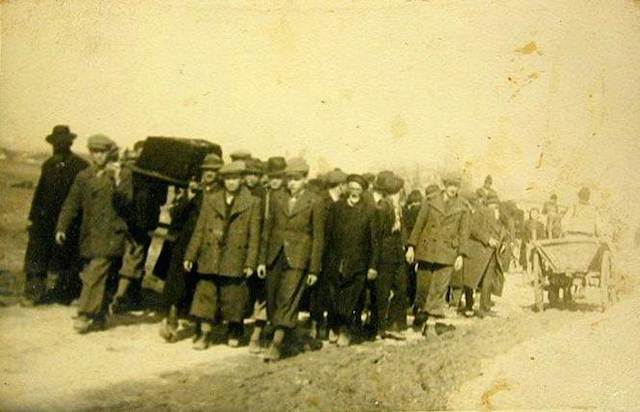
It was lucky for many Jews that such restrictions were removed. Between 1933 and 1936, more than 164,250 Jews fled Germany and entered Palestine, thus doubling the size of the Yishuv. Called the Fifth Aliyah [or Immigration], these German Jews came with money to build businesses and cities. By 1936, Tel Aviv had more than 150,000 inhabitants, and Haifa had become a major port city with more than 50,000 Jews.
Note: The author’s use of the word “terrorism” in this piece reflects his own views. Not all scholars would feel comfortable with his use of the term to describe the actions of the Irgun.
With your help, My Jewish Learning can provide endless opportunities for learning, connection and discovery.
The Yishuv recognized the need to help save Jewish children in Europe. In 1933, Hadassah [an American Jewish women’s organization] and Henrietta Szold [its founder] established Youth Aliyah, an institution to bring German Jewish children to Palestine and provide them with homes. Between 1933 and 1942, more than 5,000 children were brought into Palestine and integrated into kibbutzim. Another 15,000 were sent to Western countries by Hadassah because the British refused to allow them to enter Palestine. From its founding, Youth Aliyah provided homes for more than 140,000 Jewish children in Israel.
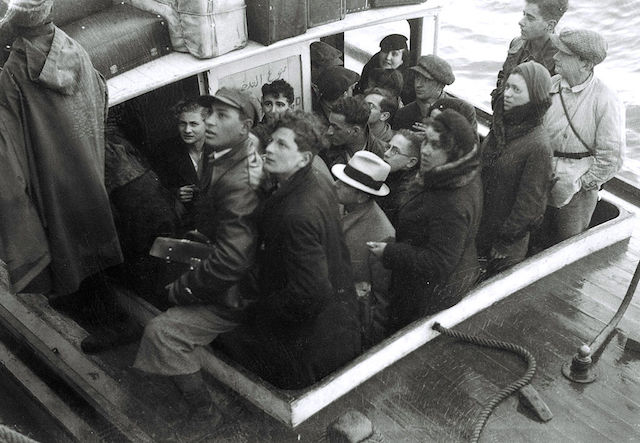
The Yishuv was outraged by Britain’s callous refusal to open the gates of Palestine to Jewish immigrants. With Hitler in power in Europe, thousands of Jews desperately needed refuge immediately. Britain adamantly refused to increase its immigration quota for Jews. The Yishuv and European Jewry organized Aliyah Bet, the institution responsible for smuggling Jews into Palestine against the orders of the British. The British called this illegal immigration; the Jews called it legitimate immigration based on the promise of the Balfour Declaration [of 1917, with its promise of a Jewish state in Palestine].
Youth movements and Zionist organizations set up transport systems to get Jews to small ports in southern Europe. From there, a part of the Haganah [the non-governmental Jewish military organization] called the Mossad L’Aliyah Bet tried to sneak boatloads of Jews into Palestine. By the end of 1939, thousands of Jews had arrived in Palestine illegally.
In 1936, despite all British attempts to placate them, the Arabs of Palestine set up a revolt against both the British and the Yishuv. Mobs attacked and ransacked the Jewish quarter of Jaffa. The Arabs declared a countrywide work strike, and the Yishuv took over all necessary civil occupations. With the permission of the British High Commissioner, the Yishuv established a port in Tel Aviv, thus replacing Jaffa, which was on strike.
The Arabs began a policy of terrorism against the British and the Yishuv. The Haganah announced a policy of restraint: defend but don’t attack. The Yishuv developed a new defense measure. They chose sites which the Arabs would have to pass to get to a Jewish town or village. In the middle of the night, groups of young Jews would race to the selected site with prefab walls. Working through the night, they would set up a defense wall (made of the prefab wooden frames filled with gravel) and a watchtower with a searchlight. Protected from immediate Arab attack, they then added houses within the walls and planted fields, creating permanent settlements.
In this way, 52 settlements formed a fence around the older Yishuv neighbors, protecting them from Arab attacks. They were called tower-and-stockade settlements, and they saved many towns from possible massacres.
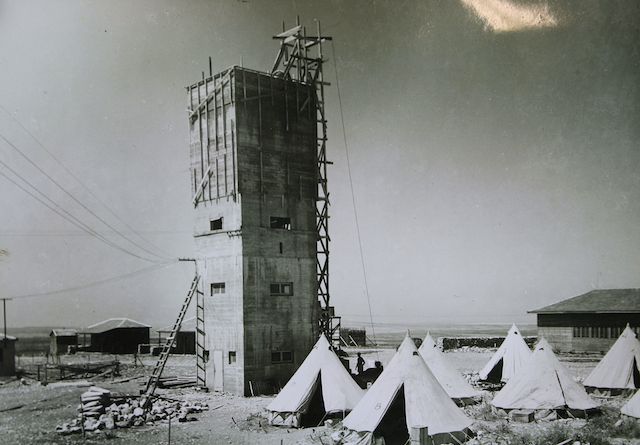
In addition, a British captain, Orde Charles Wingate, trained Jewish volunteers from the Haganah to counterattack against the Arabs and protect the British oil pipeline. Many of his students, such as Moshe Dayan and Yigal Allon, eventually became the military leaders of Israel. For his friendship with the Yishuv, Wingate was banished by the British from Palestine and never permitted to return. He was killed in Burma during World War II.
For one group of angry young Jews, the Haganah defense policy of restraint in the face of Arab attacks wasn’t acceptable. Led by Zev Jabotinsky, who was still living in exile, this group broke away from the Haganah to create a separate Jewish military force called the Irgun Tz’vaei Leumi, referred to as either the Irgun or Etzel, the acronym of its full title.
The Irgun responded to every terrorist attack with its own terrorist attack. The Yishuv, fearing political reprisals from the British, and the loss of world sympathy if Jews were seen as terrorists, opposed the Irgun and their raids.
In 1939, when the Haganah and many in the Yishuv decided to help the British fight the Nazis, the Irgun declared that the British were as much an enemy as Germany or the Arabs, and they began terrorist raids against the British. Again the Yishuv and the Haganah opposed these actions.
In 1939, when Europe’s Jews most desperately needed a haven, Britain issued another White Paper further limiting Jewish immigration to Palestine. Seventy‑five thousand Jews would be permitted to enter over a five‑year period, and then a fixed ratio of two Arabs per Jew would be maintained. This White Paper shattered the Yishuv’s hopes of attaining a Jewish state under the British Mandate. The Irgun increased its attacks against British troops.
With the outbreak of World War II, the Yishuv found itself once again in conflict. [They believed it] was clear that the British would always double-cross them, and they were dedicated to saving Europe’s Jews, despite the White Paper. However, armed attacks against the British would subsequently help Germany and the Axis Powers, which was unthinkable. Therefore the Yishuv joined forces with the British. As David Ben-Gurion declared, “We shall fight side by side with the British in our war against Hitler as if there were no White Paper, and we shall fight the White Paper as if there were no war.” The majority of the Irgun also agreed to help the British. One group, however, led by Avraham Stem, determined that the British were as dangerous as the Arabs. Called the Stem Gang (or LECHI, an acronym for the Fighters for Israel’s Freedom), this group continued terrorist raids against the British throughout World War II. One of LECHI’s officers was Yitzhak Shamir, who later became prime minister of Israel.
The Arabs, meanwhile, wholeheartedly supported Germany. The Mufti of Jerusalem went to Berlin to help the Nazis. Between 1941 and 1945, he broadcast from Berlin in Arabic encouraging the Arabs to expel the British and slaughter the Jews.
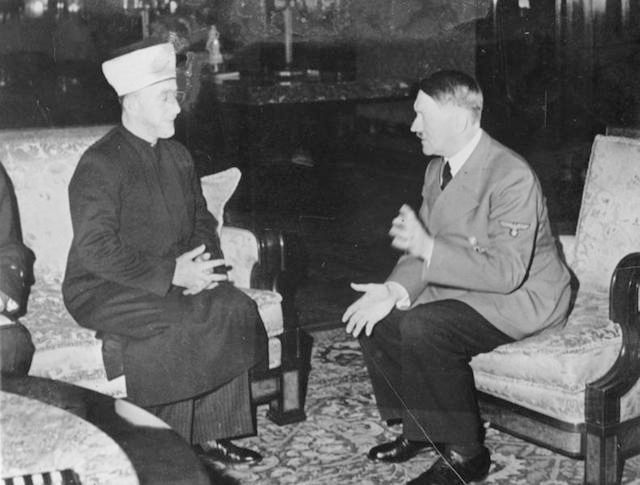
Within the first week after the beginning of World War II, more than 130,000 Jews from the Yishuv had volunteered to enter the British army. The British refused to take Jewish volunteers without accepting an equal number of Arab volunteers. The Arab leaders, however, had already pledged their support to Germany. The British therefore reluctantly accepted Jewish recruits, but they balked at permitting the Jews to establish their own recognized brigade.
In 1941 the situation for the British in Palestine was very serious. Their major front was in North Africa, trying to stop Rommel. The Vichy French were in Syria and Lebanon, threatening Palestine’s borders. The British turned to the Yishuv for help. Within the Jewish units were special fighting forces called the Palmach, the assault companies, famous for their bravery under Orde Wingate. [Their] personal hallmarks were thick handlebar mustaches. The Palmach was assigned to stop the Vichy French from crossing from the north into Palestine. They did so, suffering enormous casualties. Their reputation as courageous fighters was enhanced.
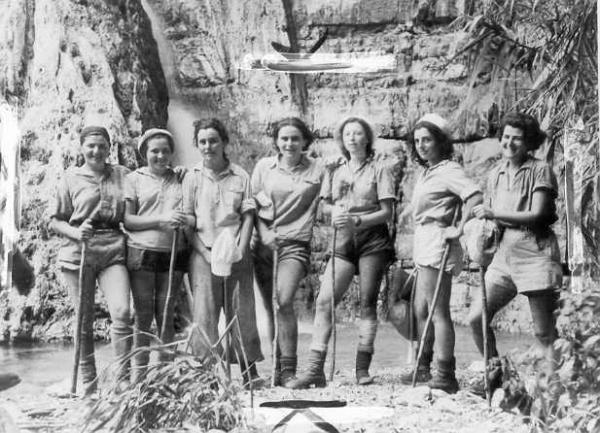
Throughout World War II, the Palmach trained rigorously and became the broad base of fighting reserves needed to provide the backbone of the Haganah. The Palmach cooperated closely with the British until after the battle of El‑Alamein in North Africa. With the German threat diminished, the British tried to dismantle the Palmach, knowing that the troops would eventually be used against them. The Palmach therefore went underground and continued to train and prepare the Yishuv for the struggle against the British which they knew was imminent. Many famous Israeli generals received their training and experience in the Palmach.
In 1944 the Yishuv finally convinced the British to let them have their own brigade. In addition to more than 26,000 Jews from Palestine serving in the British army, the Yishuv created the Jewish Brigade, consisting of 5,000 men. The Jews in the Brigade performed double duty in the army. At the same time that they were working for the British, they organized and trained for their eventual opposition to British control of Palestine. While they fought in Italy, they arranged escape routes to get Jews out of Europe after the war. All Jewish Brigade members were in the Haganah.
Jews worked on similar projects in central Europe while in the British army. An excellent example of this two‑way action was a group of paratroopers who volunteered to drop behind Axis lines to work with the nationalist patriots in Czechoslovakia, Hungary, and Yugoslavia. While fighting against the Nazis, they were also finding ways to get Jews out of those countries.
Reprinted with permission from Jewishgates.org.
Avraham
Pronounced: AHVR-rah-ham, Origin: Hebrew, Abraham in the Torah, considered the first Jew.
Moshe
Pronounced: moe-SHEH, Origin: Hebrew, Moses, whom God chooses to lead the Jews out of Egypt.
Yitzhak
Pronounced: eetz-KHAHK, Origin: Hebrew, Hebrew name for Isaac.


